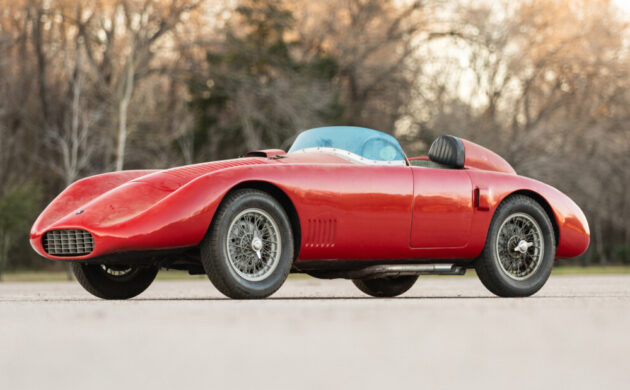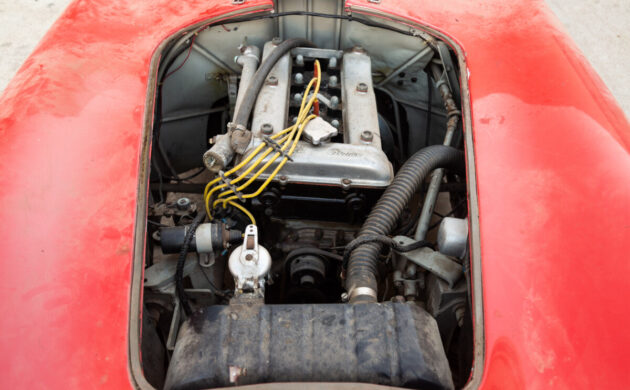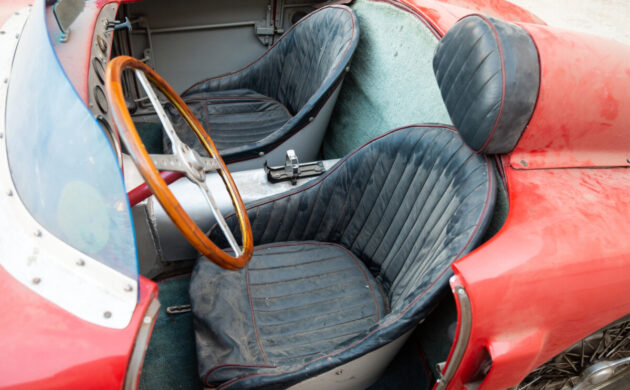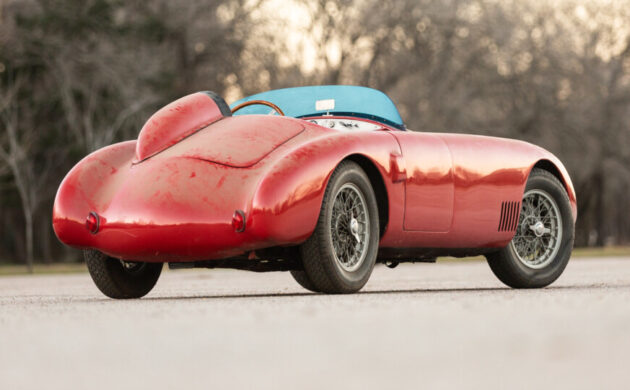OSCA’s story is entwined with Maserati. Founded in 1914 by Alfieri Maserati, Maserati’s original product was spark plugs. Other Maserati brothers were working for Diatto, making race cars. When Diatto closed its racing division, the brothers joined under one roof and commenced making their own trident-branded cars, achieving notable success on the tracks of the world. Apparently making race cars was not a financially robust endeavor – as Diatto had already found – and Maserati was forced to sell to Italian industrialist, Adolfo Orsi. Three Maserati brothers signed a ten-year contract with Orsi, which they duly fulfilled. In 1947, Ernesto, Bindo, and Ettore left to found their own company, Officine Specializzate Costruzione Automobili—Fratelli Maserati S.p.A. – which we know as OSCA. Its first car was the MT4 (Maserati Tipo 4 cilindri), utilizing the four-cylinder Fiat 1100 block; later the car was fitted with OSCA’s own 1092 cc engine, subsequently enlarged to 1350 cc’s. As the company developed its niche in racing, it introduced twin-cam versions of its motors. The cars thus fitted were called MT4-2AD. OSCA left the bodywork to customers and coachbuilders; consequently, early OSCAs all look a bit different. Here at Gooding & Company is a unique 1953 OSCA MT4-2AD, set for auction on March 2 at Amelia Island. The estimate for this car is $700,000 to $900,000. We received this tip from both jonny and Araknid78 – thanks!
OSCA chassis number 1124 was sold new to Briggs Cunningham, equipped with a 1350 cc twin cam motor. Over its short racing career with Cunningham, the car placed first in its class at Sebring. The car’s next owner raced it in SCCA events, and at some point switched the motor out for an Alfa Romeo DOHC. It is currently fitted with a 1570 cc motor of the same make, generating an estimated 120 bhp. A four-speed gearbox and finned aluminum drum brakes complete the package. With a curb weight of around 1300 lbs, this car is likely very quick. But it will take the buyer some time to figure that out since this car has been stored for forty years, sans carburetors, and needs complete recommissioning.
The interior is typical of the time for a purpose-built race car – light on comfort but perfectly suited for go-fast pursuits of the time. The leather-padded fairing, air scoops, cut-down windshield, and fire-extinguisher harness between the seats are emphatic reminders that this OSCA belongs on the track. Amusingly, the locking choke pull is the same one used on any number of British cars.
When the motor swap was completed, the car’s bodywork was also altered, giving it the current low-nose, headlight-free configuration. Formed of sheet metal, the nose sets the grille just inches off the ground. It’s a good balance to the low tail, but if a buyer had in mind a road rally, headlights are a must. The market for early OSCAs is tricky. Not many were made, each one is unique, and motor swaps were common. If a buyer had a yen for a sports racing OSCA, there is a later car selling at the very same auction, estimated at about $200k less. What do you think this one should sell for?
Copyright and Courtesy of Gooding & Company, Images by Erik Fuller.










Someone needs to make a list of all the manufacturers who used the name “Spider” for their car.
I always thought ‘spider’ was a type of car – open two seater.
Origins of the word are in horse carriages. Spider was basic and light with 4 tall wheels, so quiþe sporting.
Pretty spiffy for a 1953 car, but it does have a different look with that front. VERY HEFTY price though.
Non-original engine not manufactured by OSCA nor Maserati?
Altered bodywork?
Needs full restoration plus an original OSCA engine to compete in sought after vintage events?
I think Gooding & Gooding shot hot-air up the owners’ skirt/shorts.
I looked into the future:
“did not meet reserve”
If the car were original, the estimate would be about right, but the customized front end and Alfa motor should cut the value by at least 50 to 60 percent.
Getting this assembledge back to original will cost a fortune (unless you happen to have the correct engine sitting in your garage).
The styling of the car’s nose reminds me of the weasel guitar player in the Riverbottom Jug Band.
I’m finishing a 1948/50 Devin. In my opinion a much better looking car. All for the price of the correct engine. …..Jim.
Yes, I would marry this car.
But like any beautiful spouse, HIGH MAINTAINANCE1
sold $461,500